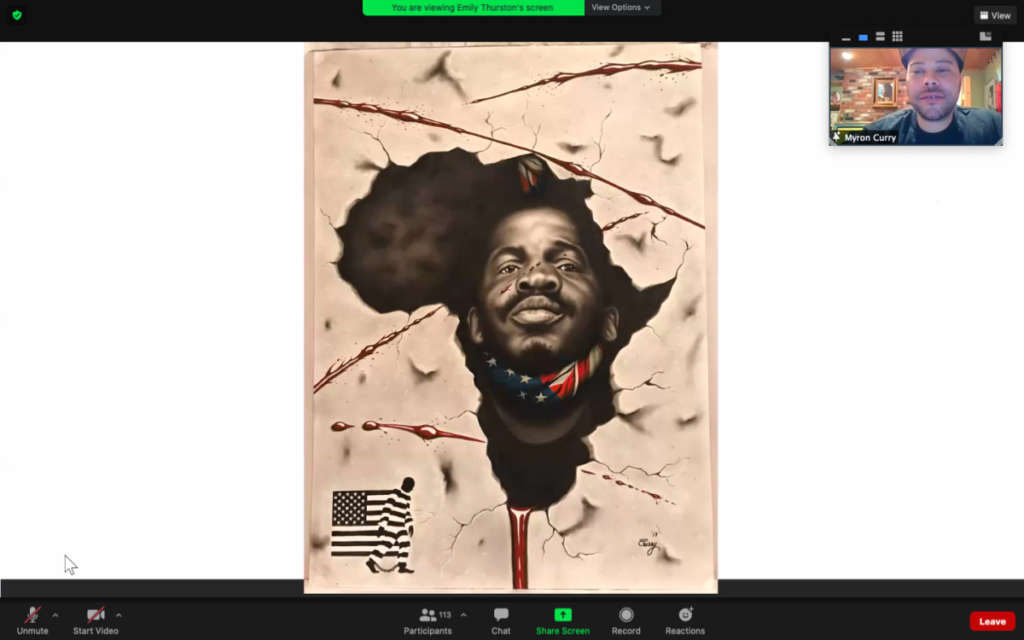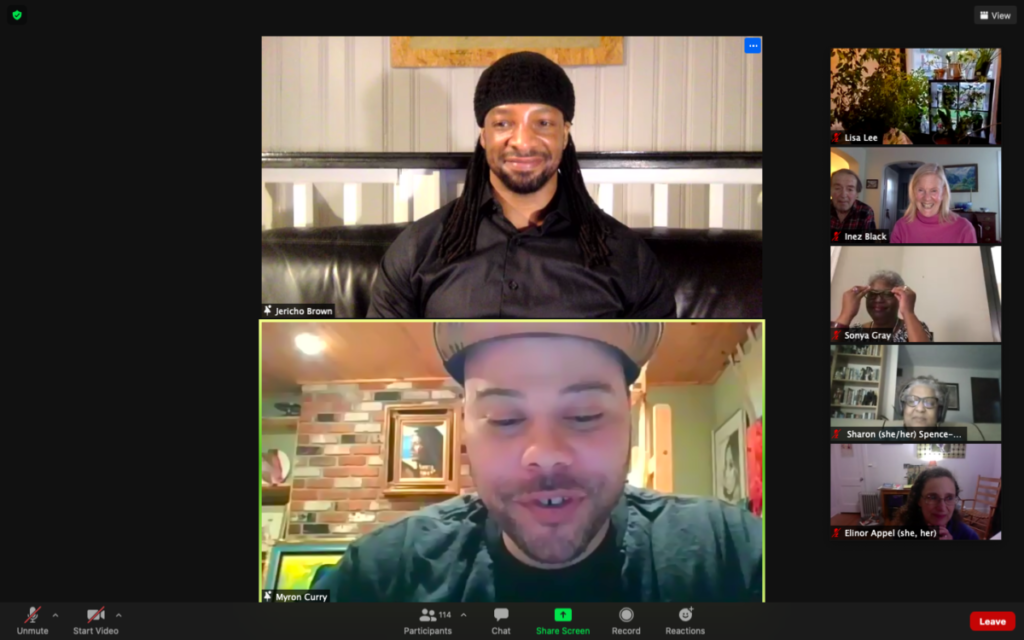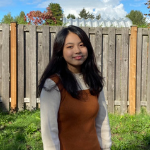On March 10th, Seattle Central hosted an evening with Jericho Brown for the Central 2 Community Series. Jericho Brown is the author of three collections of poetry and has won several awards recognizing his talent throughout his career.
The Tradition (2019) was a finalist for the 2019 National Book Award and the winner of the 2020 Pulitzer Prize for Poetry; The New Testament (Copper Canyon 2014), won the Anisfield-Wolf Book Award and was named one of the best of the year by Library Journal, Coldfront, and the Academy of American Poets; and Please (New Issues, 2008) won the 2009 American Book Award.
The event started out with introductions from Leija Farr, Seattle Central Alumna and Seattle Youth Poet Laureate, and Myron Curry, a Seattle Central student and visual artist. Then, a welcome remark from Dr. Sheila Edwards Lange, president of Seattle Central College, was cordially given. She stated that the community series is meant to shine light on artists and to advance racial and social justice. After sharing some sentiments about how poetry is incredibly relevant to our society, she passed the floor to Myron Curry.
Curry briefly introduced himself again and shared some anecdotes about his experience with art. “To me, my artwork is like my therapy,” Curry said. “Art is something that helps me get through not just tough times, but helps me celebrate times.” He talked about how he learns about people as he paints them. He continued to talk about his passion for visual arts before showcasing some of his artwork.

Curry described the above painting as dry brush and compared it to photo realism.

He talked about how he also makes oil and acrylic paintings. In reference to the painting on the left, Curry talked about how classical music soothes his soul. After wrapping up his showcase, he passed the floor to Jericho Brown.

Brown starts off with a poem called ‘Prayer of the Backhanded’. The next poem was called ‘Foreday in the Morning’, which was titled after a saying that Brown had heard only in Louisiana, where he grew up. He shared how he loved to incorporate sayings from his hometown into his poems in hopes of trying to resurrect them.
One of the phrases he shared was “n’em”, an abbreviation of ‘and them’, to refer to one person and everyone you associate them with.
He continued to read a few more poems while engaging the audience with the stories behind the poems as well as his life experiences. Comments of praise and admiration streamed in as he recited the poems in a clear voice full of passion and emotion. Brown concluded his reading with ‘Stand’, an evocative poem about cuddling.
“Hearing poetry goes straight to you in a different way,” Curry praised Brown. Brown then enthused about how listening to people read poetry will enable you to hear poems with more rhythm and emotion when you read them yourself. The participants, still in awe of Brown’s talent, wholeheartedly agreed. Curry then gave a biographical overview of Jericho Brown.
“Jericho Brown grew up in Louisiana and worked as a speech writer for the mayor of New Orleans before earning a PhD in literature and creative Writing from the University of Houston,” Curry said. “He also earned an MFA in creative writing from the University of New Orleans. He graduated Magna Cum Laude from Dillard University. He’s a Charles Howard Candler professor of creative writing and director of the creative writing program at Emory University in Atlanta.”
When Curry asked what the most memorable moment in his journey was, Brown replied in wonderment as he reminisced about how many memorable moments he has had. He mentioned that he had an amazing prayer and meditation the night before. Referring to people who believed in God, Brown said, “If we believe that God is everywhere, why do we assume that that doesn’t include me?” He proceeded to explain how he could feel God’s pride while he meditated.
Next, Brown was asked about what motivates him to write poetry, to which he replied, “Thinking about how songs can be made helps me think about how poems can be made.” He takes something that excites him from a song and constructs a template of how he would like to write a poem on it. He mentioned that the context behind music and poems bring inspiration.
Brown revealed how much he used to love the song “Lovin’ You” by Minnie Riperton. He told us about how he sat in the backseat of a car hearing her sing ‘No one else can make me feel the colors that you bring’ and talked about how amazed and fascinated he was at the poetry of the line. “One of the lyrics of that song I’ll never forget,” he said. “I was sort of doomed, you know? I was going to be a poet.”
Then Curry asked how Brown felt about the relationship between politics and poetry. He responded by paraphrasing a quote by June Jordan: every poem is a political poem because it involves telling the truth. “Poems have brought me to feeling such that I have to think about what I’m feeling,” he said. He told us that although he doesn’t set out to be political when he writes, his poems can be looked at from various lenses.
On the topic of his writing and publishing process, Brown shared that he gives himself writing exercises as well as just writing down whatever comes to mind. “I try to reinvent language and try not to think about what I’m writing,” he said. Brown expanded on that by sharing that he tries to work backwards after he has a few pages of nonsense and tries to make sense of the mess of text.
Next, he mentioned black publishing companies, black magazines, and presses that are run by black people including the Northwestern University Press.
Brown brought an extremely contagious enthusiasm and passion to the meeting that engaged everyone in the conversation. He ended the event by reading one last poem called “Crossing.” He touched our hearts one last time with a line in the poem, “I don’t march. I’m the one to leap.”
Lastly, on the topic of his book The Tradition, Brown dove into a heavy conversation about sexual assault and rape culture in our society, specifying that he used poetry to talk about these issues in the second section of the aforementioned book. “I wrote those poems during a time when I felt like it would be dishonest and immoral of me not to make use of my poems to tell a more direct truth,” Brown confessed. He talked about how all three books contained poems about being raped but that this was the first time he wrote about it in a way so direct that he was actually using the word. “I would not have done that if not for the Me Too movement,” he added. The conversation continued to emphasize the sexual violence against men and the lack of acknowledgement towards the seriousness of the issue.
Due to internet difficulties, Leija Farr was not able to host the event along with Myron Curry. However, we were able to end the event by reading Leija’s poem. The audience expressed how they felt from reading the poem as well as their gratitude to everyone who organized the event as they trickled out of the Zoom meeting.
Jericho Brown is on Twitter and IG. His website is jerichobrown.com.
Author

Alex Su is a Biochemistry student and a staff writer at the Collegian. Harboring a passionate love for fiction, she enjoys writing prose as much as reading books. She’s fascinated by the complexity of living things and aims to work in the medical field. She likes writing for the Collegian as much as bullet journaling, drawing, and eating.












Be First to Comment